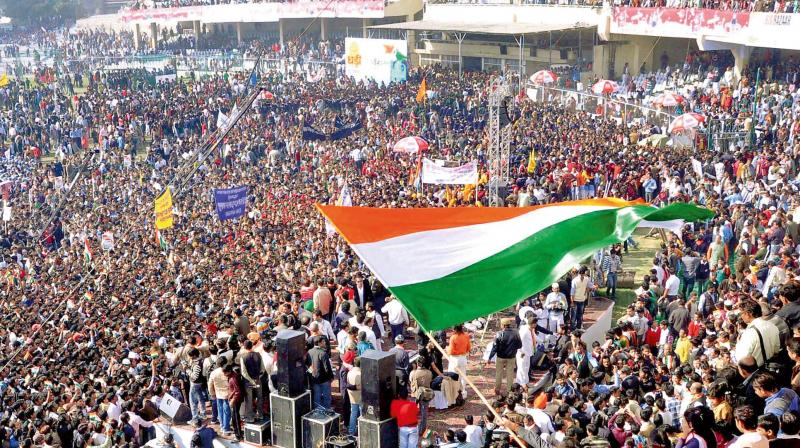The thin line between jingoism and patriotism

I had an irritating experience while watching Aamir Khan’s Dangal recently. During the national anthem sung within the film, a few people got up. I did not. A lady next to me tapped on my shoulder suggesting that I get up too. To avoid an ugly scene I rose from my seat but later, made my point to her. I did stand during the anthem before the start of the film. Ordinary people, who honestly pay taxes, love their land, are far more patriotic than false patriots.
Jingoism, false patriotism, is causing concern worldwide with the rise of people like the U.S. President Donald Trump. That is why a Swedish television journalist in Mumbai, Malin Mandel Westberg, found it necessary to interview me on my experience while watching the film and this was aired primetime on Swedish T.V. on our Republic Day along with the coverage of celebrations.
I am happy when our sportspersons win medals for the country but the obsession with medals as depicted in Dangal, only adds to this false patriotism. A real sporting spirit goes beyond this. I am a proud Indian but having said that, I must say a true patriot should be the first to criticise wrong policies of his or her government. As Noam Chomsky has pointed out: “It would be very unpatriotic of an American not to oppose America’s war in Iraq”.
Some people have very strange ideas about being patriotic. I’m part of the Pakistan India Forum for Peace and Democracy, an organisation of democratic people on both sides of the border. But some think it is almost being anti-Indian to have friendship with Pakistan. Some are also surprised that I visited Pakistan for a conference of this organisation in 2003 in Karachi. To be a true Indian you are expected by some people to hate Pakistan. That is sad. I am very critical of many policies of the Pakistani establishment. But people everywhere are basically nice and there should be people-to-people contact.
I was attracted to the Soviet Union during the cold war era. I worked as a journalist for many years but when a Russian asked me over dinner some years ago to work for him, actually pass on some political information to him, I declined politely. That is because my soul and I are not for sale. I believe in an ideology but this cannot be traded. It is possible to be an internationalist and at the same time to be true to one’s country. “Be true to thine own self” as Shakespeare said. The logic behind the slogan: “Workers of the World Unite, you have nothing to lose but chains” is very good. But countries, which ruled in the name of communism, did not do a very good job in promoting this.
Mahatma Gandhi is our great asset, strength. His views on simplicity, decentralisation and environment are most precious and we should be very wary of grand-sounding ideas like India becoming a superpower, world-class and that sort of stuff. It is very deceptive, even insulting to talk in these terms when people do not have water, food, healthcare and housing. Attaining equality, happiness for all should be our goal — it may be difficult to achieve but it is desirable. The current path of development leading to growing inequalities is dangerous. The rise of the Naxalite movement in answer to this shows there are flaws. We talk with pride about being Indians but we have colonised the lands of poor in our own country — taken away their livelihood, rivers and farms.
Our best guides on this are two texts, Tagore’s essay on nationalism in 1917 and Mahatma Gandhi’s Hind Swaraj of 1910. Tagore warned that political forces should not be allowed to overrun common people in the name of the Nation. Gandhiji was against a centralised, monolithic State that enslaved, alienated people. Their vision is very relevant. BJP supporters like to flaunt their patriotism. But look what the BJP-led government did in 2003 during the celebration of 150 years of the Indian Railways. The Indian Railways claimed in full-page newspaper advertisements that India’s freedom struggle began in 1853 with the running of the first train between Mumbai and Thane. Can you beat that?
The truth is that the railways were established mainly to meet the requirements of British capital and there was a big increase in the network to prevent outbreaks of revolts as in 1857. And our BJP types think the freedom struggle began in 1853. Worse, a picture on the cover of the invitation for the 150th anniversary ceremony showed two Indians, one in a traditional dress and another almost half-naked polishing the boots of two Britons, who are lying in comfort in a railway compartment in 1891. One of the Britons is smoking the traditional hookah on the upper berth. Surely, BJP supporters need to have a better understanding of history and concepts such as patriotism and nationalism.
The writer is a columnist and a former journalist

